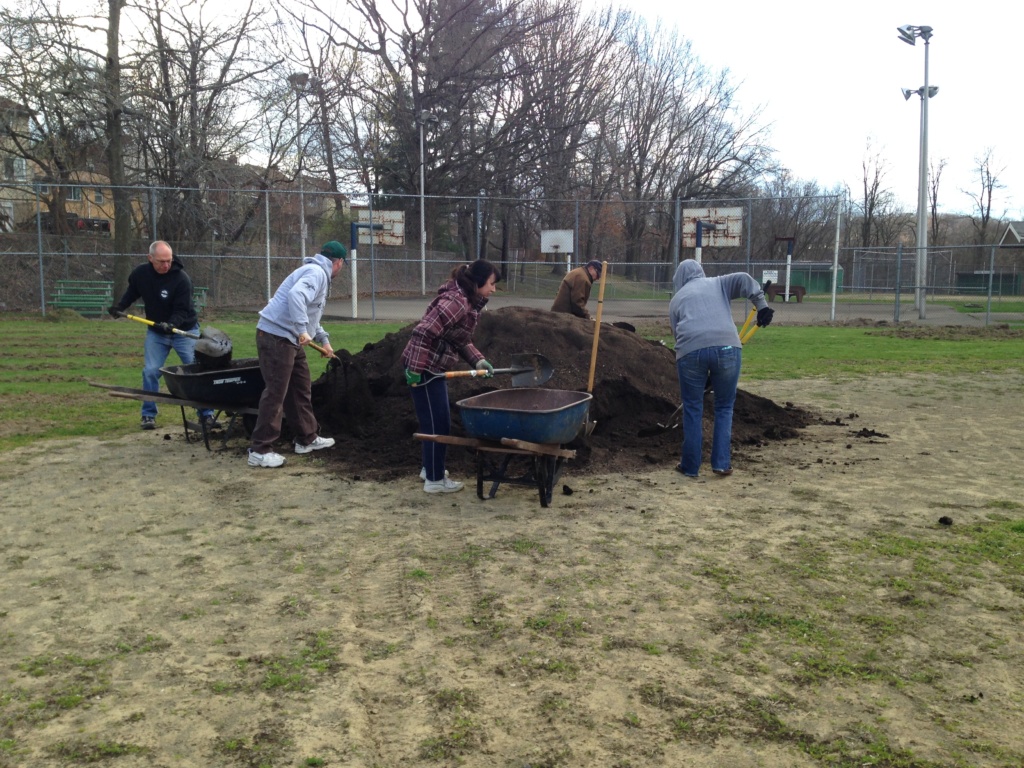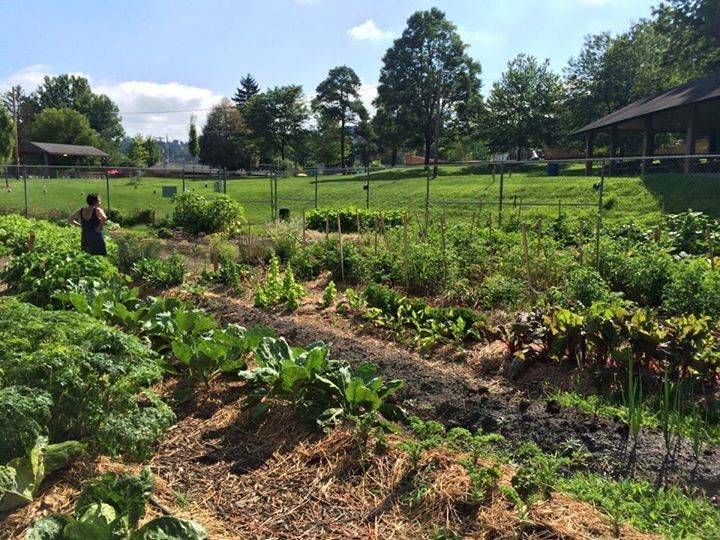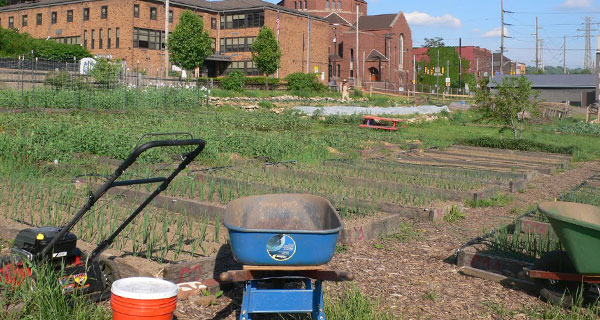Compost
Compost, composed of household wastes and other organic materials such as newspaper, leaves, and grass, provides valuable nutrients to garden soil. Used as a soil amendment or mulch, compost also helps to suppress weeds and disease-causing pests. Below are resources for starting a home compost pile, ways to improve your existing compost pile, and how to make compost tea.
A healthy compost bin requires a recipe of 1 part green matter to 3 parts brown matter:
Green matter includes: Coffee grounds, grass clippings, hair clippings, garden detritus (weeds without flowers or seed heads, plant stems after harvest), kitchen scraps
Brown matter includes: Shredded cardboard, shredded paper or newspaper, paper towels/napkins, sawdust (from untreated wood), woodchips, straw, chopped leaves


Soil
Building nutrient-rich, balanced soil is crucial to growing an abundant and healthy vegetable garden. Loamy (lightweight), dark-colored, well-drained soil is the best type for growing vegetables and herbs. If the soil quality is poor, add compost to build it up and/or build raised beds.
Optimum pH Level: Neutral to slightly acidic (between 6 and 7)
For more reading on healthy soil for growing food, check out this Cornell Soil Health Assessment Training Manual.
Soil Testing
Before starting a vegetable garden, it is essential to test the soil for lead and heavy metals. In addition, successful plant growth requires balanced levels of nitrogen (N), potassium (K), and phosphorus (P), in addition to other nutrients.
We recommend sending your soil samples to UMass Amherst’s Soil and Plant Testing Lab. Their $20 Standard Soil Test includes results for pH, basic nutrients, heavy metals and aluminum. Test results include suggestions for how to adjust nutrient and pH levels using organic amendments.
Penn State Extension offers a Standard Soil Test for $9 through the Soil Fertility Testing Program. Each sample is analyzed for pH and basic nutrients (using the Mehlich 3 (ICP) test). This test does not include heavy metals. The final report includes recommendations to adjust soil nutrition for specific crops.

How To Sample Your Soil
- Look your field or property over. You may want to do separate sampling based on past land use, e.g. one sample for where the garage used to stand, and another for the backyard area (find historical land uses with Google Earth’s time slider, Sanborn Maps and Penn Pilot aerial photography). Other factors to consider in dividing your site into sample areas are soil texture, slope, drainage, color, and past pest and fertility management. In all, each individual sample area should not exceed 2,500 square feet (50’x50′). It is essential to make a note of how you are dividing your site so you can interpret your results later.
- Each sample should be a mixture of 10-12 separate scattered samplings taken over a large area which will be the garden (avoid taking samples near the edge of the land plot or areas where you will not garden). Try to be random in your sampling. Avoid sampling very wet soils.
- Use clean, non-galvanized tools, including buckets. (Galvanized tools contain zinc, which may affect your soil sample.) We recommend using trowels or shovels and fence post diggers in compacted soil. If heavy metals are a concern, wear gloves while sampling.
- For each sample, pull back the top layer of grass, etc. to expose the bare soil. The sample should be at least 1/2 inch thick and about 1 inch in diameter, taken from two to ten inches below the soil’s surface.
- Place each of the 12 individual samples in a clean container (pail, bucket, or bag). Thoroughly mix the samples together, then divide the combined amount in half. Store one half the sample in case you need to re-test later. With the other half, break up any clods, and remove debris (rocks, glass, plant matter). Spread the mixture out on a clean paper to air-dry (do not dry soil in an oven). Stirring occasionally, it will take approximately a day.
- Once dry, mix the soil again. Pick out any rocks, trash or plant matter. A sieve can make this step much easier. Obtain a one cup measure of the soil mixture and place it in a zip-lock type bag. Save another one cup sample in case you need to re-test.
- Label the outside of the bag clearly with your name, address, and a sample ID. The ID should be less than 10 letters long (labs have limited space on internal labeling . Don’t forget to record how you are labelling your samples so you can interpret your results later.
Interpreting Your Results
Obtaining Soil and Compost
There are many options for obtaining soil and compost around Pittsburgh. Note: Some supply centers require truck pick-up depending on quantity purchased.
Grow Pittsburgh’s Garden Resource Center provides compost to members. ($40 for an individual season membership.)
Construction Junction & the East End Food Coop sell Ohio Earth Foods potting soil.
Volume
Weight
1 cubic foot of soil = Approximately 70 lbs.
1 cubic yard of compost = Approximately 700 lbs.
1 cubic yard of soil = Approximately 1,000 lb.
A heavy duty pickup truck with a long bed can carry approximately 2 cubic yards of compost / 1 cubic yard of soil.
A lightweight pickup can carry about 1 cubic yard of compost / less than 1 cubic yard of soil.
Note: Wet soil weighs the most; compost weighs less; mulch weighs the least.
Local Sources
Municipal Compost
If you live outside the City of Pittsburgh, your municipality may have a compost pile made from leaf litter collected each fall.
Allegheny County Composting Directory (disabled) – find an archived list here.
Note: Wilkinsburg Borough offers free leaf compost to Wilkinsburg residents (located at Hunter Park). Contact the Borough office for details: (412) 244-2900.
AgRecycle
335 North Braddock Avenue
Pittsburgh, PA 15208-2512
Ph: (412) 242-7645
Develops natural mushroom manure and shredded bark mulch from composted yard clippings and post-consumer food waste (from Whole Foods, local restaurants, cafeterias, etc.). Sells soil-compost mixes.
Note: You must have a pick-up truck to buy from the Braddock Avenue location.
Allison Park Landscape Supply
2631 Felicity Avenue
Allison Park, PA 15101
Ph: (412) 486-6967
Construction Junction
214 N Lexington Street
Pittsburgh, PA 15208
Ph: (412) 243-5025
Garden Dreams Urban Farm & Nursery
806 Holland Ave.
Pittsburgh, PA 15221
Ph: (412) 638-3333
$5 a 30 qt. bag for bag-your-own compost and shredded leaf mulch. Available April – September or by appointment.
Ohio Earth Food
5488 Swamp Street, N.E.
Hartville, Ohio 44632
Ph: (330) 877-9356
Natural potting soil, amendments, and fertilizers
Organic Mechanics
110 E Biddle Street
West Chester, PA 19380
Ph: (610) 380-4598
Manufactures and distributes organic potting soil (available at Whole Foods Market)
Sestili Nursery
3721 Swinburne St, Pittsburgh, PA 15213
Ph: (412) 681-1200
Sells compost by the bag
